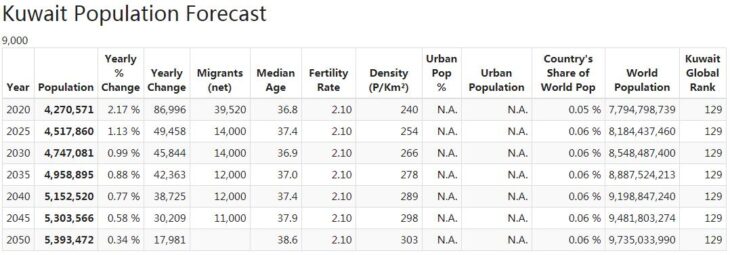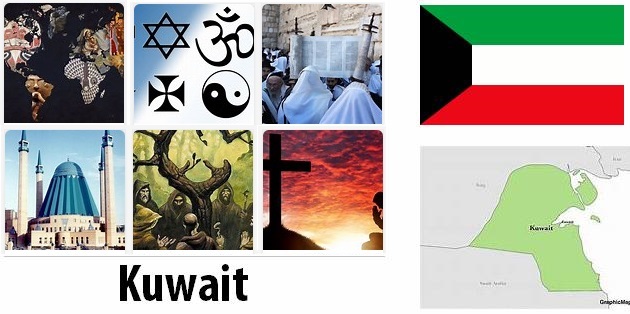Kuwait Religion
Islam is state religion and a majority of the population are Muslims. Most are Sunnis, but close to one-third of the population are Shi’ite Muslims. To some extent, this is a class issue: the royal family and the country’s elite belong, for example, to Sunni Islam, while Bidun is usually Shiite.
Tensions that existed between Shia and Sunni in the 1980s, then often inspired by Shia Muslim Iran, are feared to grow again as a result of the violence that has occurred in the region in recent decades. In 2015, a suicide attack occurred against a Shiite mosque that claimed nearly 30 lives. But the suicide bomber was identified as an influential Saudi extremist and the deed was followed by grief manifestations from both Sunnis and Shiites in Kuwait. The Islamic State (IS) international jihadist movement took on the attack.
Among the Shiites there are groups of different ethnic backgrounds: some from areas of the Persian Gulf populated by Arabs, such as Iraq, while others have a long way back in what is today Iran.
Religious freedom prevails. Several Christian minority groups have erected their own churches. Maronites (from Lebanon) apply to one of several Catholic congregations and several Orthodox faiths are represented as well as the Anglican Church. The Lutheran World Federation has no member church in Kuwait, however, there is an evangelical orientation and other smaller, Protestant congregations.
Kuwait has long been a fairly secularized country where religious minorities could freely exercise their faith. They still can, but there are reports that other than Sunni Muslims have encountered problems when they wanted to build mosques or churches. One can also see a burgeoning fundamentalist Islamic revival. This is noticed, among other things, by the fact that previously sparsely visited mosques are now crowded during Friday prayers and that Islamic sharia-based legislation has begun to be applied more strictly. Mission from other views of life directed at Muslims is often met with suspicion in Muslim countries.
- Countryaah: Population statistics for 2020 and next 30 years in Kuwait, covering demographics, population graphs, and official data for growth rates, population density, and death rates.
2017
December
New government takes office
December 11
A new government takes office, one and a half months after the last resignation (see October 30). New Defense Minister becomes the emir’s eldest son, 69-year-old Sheikh Nasser Sabah al-Ahmad al-Sabah, who has not previously served in the government. Of the other 15 ministers, 8 are new. The Prime Minister remains.
Leaders are absent from GCC summit
December 5
Hopes for a solution to the conflict within the GCC come to shame when everyone except the host country of Kuwait and Qatar is represented at a lower level at the regional cooperation organization summit in Kuwait. The meeting ends prematurely and is overshadowed by Saudi Arabia and the United Arab Emirates declaring that they intend to form a new organization to strengthen their military, political, economic, trade and cultural cooperation.
November
Opposition leaders among 67 convicted
November 27th
One court sentenced opposition leader Musallam al-Barrak and 66 others to prison for violence against police in connection with the storming of Parliament (see November 2011). Barrak and two Islamist MPs are sentenced to seven years’ imprisonment, while a third MP and the other 63 are sentenced to one to seven years. Barrak has already served two prison sentences for insulting the emir (see April 2017). Among those convicted are both Islamists and nationalists.
October
The government is leaving
October 30th
Since opposition members in parliament raised a distrust vote against a high ranking government member, the emir accepts the resignation of the government. The designated minister is accused of financial and administrative irregularities. For the time being, the government remains in a transitional capacity. On November 1, Sheikh Jabir gains new confidence as prime minister.
September
Sanctions against North Korea
September 17th
As punishment for North Korea’s missile tests in Asia, Kuwait faces a series of sanctions against the regime in Pyongyang. North Korea’s ambassador is ordered to leave Kuwait at the same time as Kuwait’s diplomatic representation in Pyongyang is being downgraded. The thousands of North Koreans working in Kuwait should not have their work permits extended and trade between Kuwait and North Korea stopped.
July
Iran is accused of terrorist links
July 20
Kuwait orders 15 Iranian diplomats to leave the country, as a result of the Supreme Court sentencing 21 people for membership in a terrorist cell that Iran is accused of being behind. Kuwait is also protesting Lebanon when the influential Shiite Hezbollah militia, which is close to Iran, is accused of contributing to training the suspected terrorists. Several of the convicted must have left the country.
June
15 years in prison for insult
June 19
An opposition activist, Sager al-Hashash, is sentenced to 15 years in prison for insulting the judiciary in a statement on Twitter. Hashash was also sentenced in 2015 to 10 years in prison, for having been charged with assaulting police and reporting on how weapons are manufactured, also via Twitter. He has not yet started serving that sentence when the verdict is appealed. The new verdict can also be appealed.
April
Opposition leaders are calling for reconciliation
April 24
Opposition leader Musallam al-Barrak, recently released from prison (see July 2014), calls for national reconciliation. He says at a mass meeting that the country is heading for disaster, but that the opposition wants to contribute to a solution. No one questions the legitimacy of the royal house, according to Barrak, but the rights that have been truncated in recent years must be reinstated.
March
Suspended citizenship must be restored
6 March
Several opposition politicians and dozens of their relatives who all had their citizenship revoked in 2014 will now rejoin them, says opposition MPs who thank the emir for the decision. Among those who will now regain citizenship is opposition spokesman Saad al-Ajmi, who was deported to Saudi Arabia.
February
Iranian President visiting
February 15
Iranian President Hassan Rohani visits Kuwait with the aim of improving relations strained by the conflicts in Yemen and Syria. Rohani has also visited Oman, but not Saudi Arabia.
January
Seven prisoners executed
January 25
A member of the royal family, convicted of murder and illegal possession of weapons, is found with seven people executed. Among the other convicted are citizens of Bangladesh, Egypt, Ethiopia and the Philippines. It is the first time since 2013 that the death penalty has been enforced in the country.


